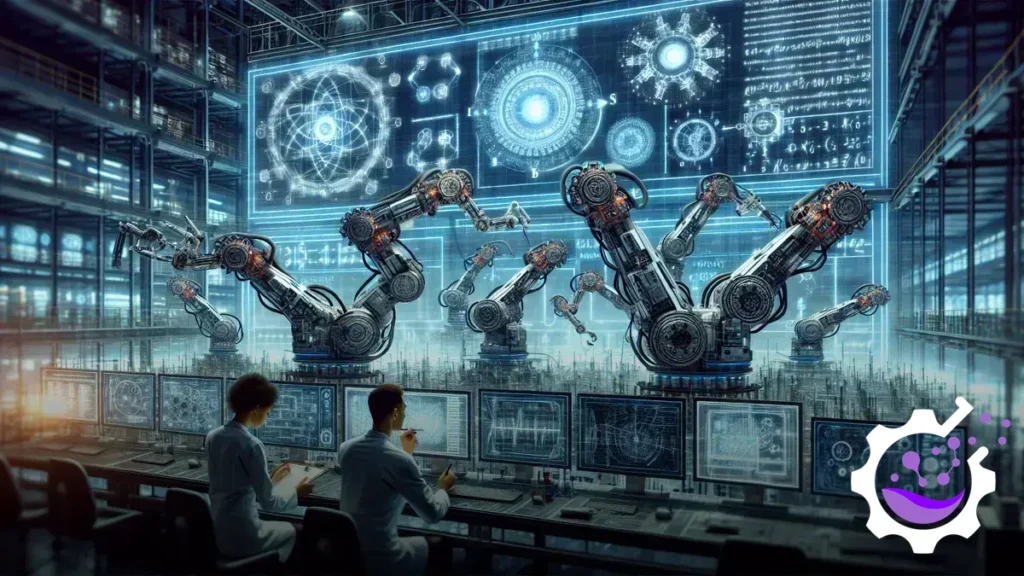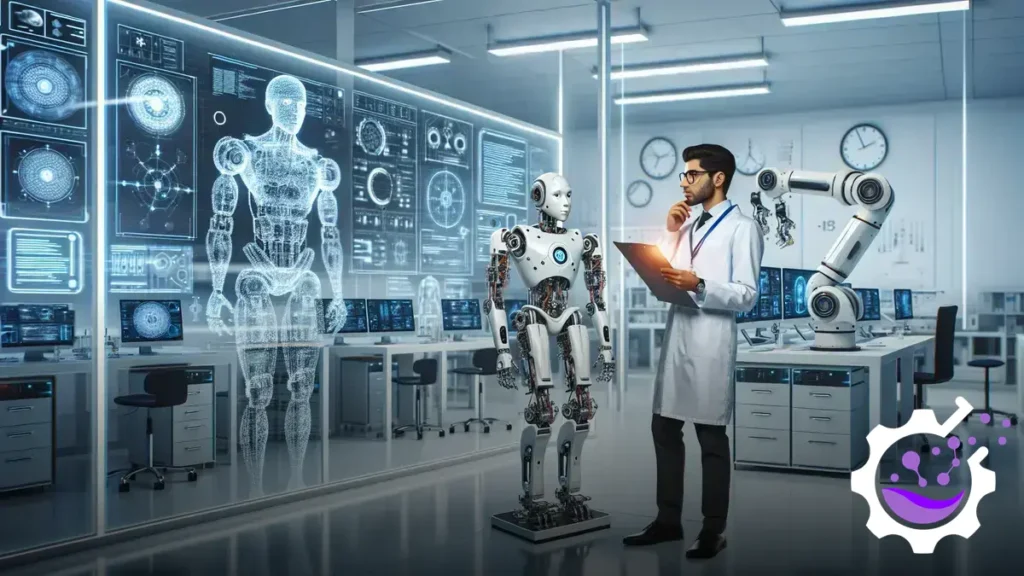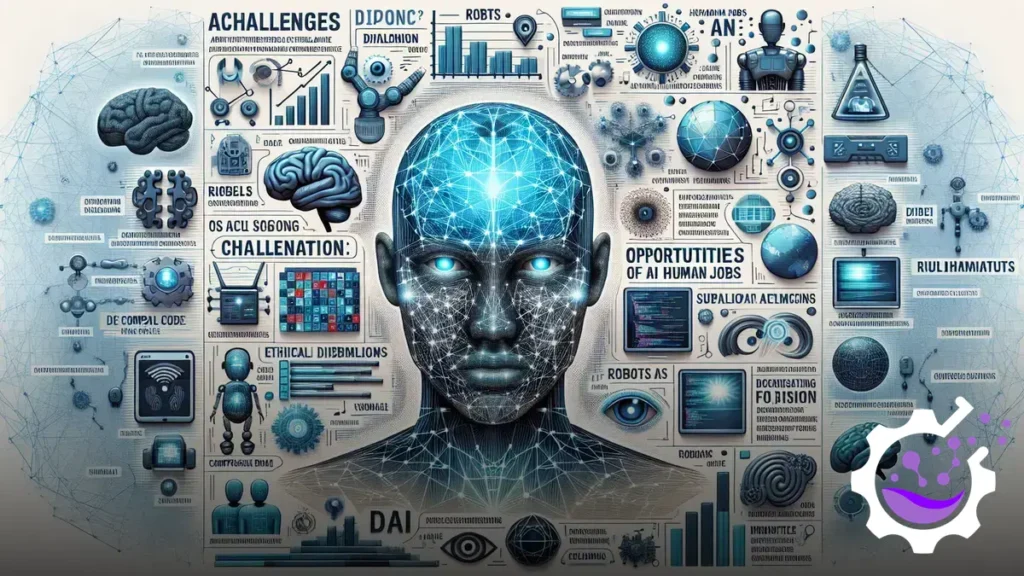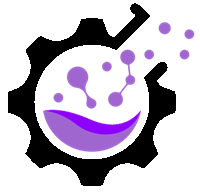Revolutionizing Robotics with Artificial Intelligence
Artificial Intelligence in Robotics is revolutionizing the way we interact with technology, with the potential to transform industries and improve our everyday lives. As we delve into the world of robotics, it’s important to understand the role that Artificial Intelligence plays in this field. From advancements in machine learning and computer vision to the integration of AI-powered sensors and actuators, the possibilities for future developments are endless. However, with these advancements come a unique set of challenges and opportunities that we must navigate to fully realize the potential of Artificial Intelligence in robotics.
Key Takeway
- Robotics is being transformed by artificial intelligence.
- AI allows robots to learn and adapt in real-time.
- This technology is revolutionizing industries such as manufacturing and healthcare.
- The combination of robotics and AI is increasing efficiency and productivity.
- AI-based robots are capable of performing complex tasks with precision and accuracy.

Revolutionizing Robotics with Artificial Intelligence
Artificial Intelligence (AI) has emerged as a game-changer in the field of robotics. With its ability to mimic human intelligence and learn from data, AI has revolutionized the way robots operate, making them more efficient, adaptable, and capable of performing complex tasks.
One of the key areas where AI has made a significant impact is in autonomous robots. These robots are designed to operate without human intervention, using AI algorithms to analyze their surroundings, make decisions, and navigate through different environments. This has opened up a whole new world of possibilities, from self-driving cars to delivery drones.
AI has also transformed the manufacturing industry, with robots taking over repetitive and dangerous tasks. By using AI-powered vision systems, robots can identify and manipulate objects with precision, improving efficiency and reducing the risk of accidents. This has led to increased productivity and cost savings for businesses.
Another area where AI has revolutionized robotics is in healthcare. Robots equipped with AI algorithms can assist in surgeries, perform repetitive tasks, and even provide companionship to patients. This not only improves the quality of care but also reduces the workload on healthcare professionals.
AI has also played a crucial role in the development of humanoid robots. These robots are designed to resemble humans in appearance and behavior, making them more relatable and easier to interact with. With AI, these robots can understand and respond to human emotions, making them valuable companions and assistants in various settings.
Furthermore, AI has enabled robots to learn from their experiences and adapt to changing circumstances. Machine learning algorithms allow robots to analyze data and improve their performance over time. This has led to the development of robots that can learn new tasks, adapt to different environments, and even collaborate with humans.
However, the integration of AI into robotics also raises ethical concerns. As robots become more intelligent and autonomous, questions arise about their impact on employment, privacy, and safety. It is crucial to have regulations and guidelines in place to ensure the responsible use of AI in robotics.
Artificial Intelligence has undoubtedly revolutionized the field of robotics. From autonomous robots to humanoid companions, AI has made robots more capable, adaptable, and intelligent. However, it is essential to strike a balance between technological advancements and ethical considerations to ensure the responsible and beneficial use of AI in robotics.
The Role of Artificial Intelligence in Robotics
Artificial Intelligence (AI) has revolutionized the field of robotics, enabling machines to perform complex tasks and interact with their environment in ways that were once only possible in science fiction. With the integration of AI, robots are becoming smarter, more adaptable, and capable of learning from their experiences.
One of the key roles of AI in robotics is enabling machines to perceive and understand their surroundings. Through advanced sensors and computer vision algorithms, robots can analyze visual data, recognize objects, and navigate through complex environments. This ability is crucial for robots to interact with humans and perform tasks in real-world scenarios.
AI also plays a vital role in enabling robots to make intelligent decisions and adapt to changing circumstances. Machine learning algorithms allow robots to learn from data and improve their performance over time. This capability is particularly useful in tasks that require decision-making, such as autonomous driving or industrial automation.
Furthermore, AI enables robots to communicate and collaborate with humans and other machines. Natural language processing algorithms allow robots to understand and respond to human commands, making them more user-friendly and accessible. This opens up new possibilities for robots to assist in various domains, including healthcare, education, and customer service.
Another area where AI is making a significant impact in robotics is in the development of humanoid robots. These robots are designed to resemble humans both in appearance and behavior, and AI algorithms are used to enable them to understand human emotions, gestures, and speech. This makes them ideal for applications such as social companionship, therapy, and caregiving.
AI also plays a crucial role in ensuring the safety and reliability of robots. Through the use of AI algorithms, robots can detect and avoid obstacles, predict potential hazards, and make real-time adjustments to their actions. This is essential in applications where robots work alongside humans or operate in dynamic environments.
Overall, the integration of AI in robotics has transformed the capabilities of machines, enabling them to perform tasks that were once considered impossible. From autonomous vehicles to humanoid robots, AI has opened up new possibilities for the future of robotics. As AI continues to advance, we can expect to see even more innovative and intelligent robots that will revolutionize various industries and improve our daily lives.

Advancements in Artificial Intelligence for Robotics
Artificial Intelligence (AI) has revolutionized the field of robotics, enabling machines to perform tasks that were once thought to be exclusive to humans. With the rapid advancements in AI technology, robots are becoming more intelligent, autonomous, and capable of adapting to various situations.
One of the key areas where AI has made significant progress is in the field of computer vision. Robots equipped with advanced AI algorithms can now perceive and interpret visual information, allowing them to navigate their surroundings, recognize objects, and even interact with humans. This has opened up a wide range of applications in industries such as manufacturing, healthcare, and logistics.
Another area where AI has greatly impacted robotics is in natural language processing. Through the use of AI-powered speech recognition and language understanding algorithms, robots can now understand and respond to human commands and queries. This has paved the way for the development of intelligent personal assistants and service robots that can assist humans in various tasks.
Machine learning, a subset of AI, has also played a crucial role in advancing robotics. By analyzing large amounts of data, robots can learn from their experiences and improve their performance over time. This has led to the development of robots that can adapt to changing environments, make decisions based on real-time data, and even learn new tasks on their own.
One of the most exciting advancements in AI for robotics is the development of collaborative robots, also known as cobots. These robots are designed to work alongside humans, assisting them in tasks that require precision, strength, or endurance. With advanced AI algorithms, cobots can understand human intentions, predict their actions, and adjust their behavior accordingly, making them valuable partners in various industries.
AI has also made significant progress in the field of robotics automation. By combining AI algorithms with robotic systems, companies can automate repetitive and mundane tasks, improving efficiency and productivity. This has led to the rise of smart factories, where robots equipped with AI can work alongside humans to optimize production processes.
However, with all the advancements in AI for robotics, there are also concerns about the ethical implications. As robots become more intelligent and autonomous, questions arise about their impact on employment, privacy, and safety. It is important to ensure that AI-powered robots are designed and programmed with ethical considerations in mind, to prevent any unintended consequences.
The advancements in artificial intelligence for robotics have opened up new possibilities and opportunities in various industries. From computer vision to natural language processing, machine learning to collaborative robots, AI has transformed the capabilities of robots, making them more intelligent, adaptable, and efficient. However, it is important to address the ethical implications and ensure that AI-powered robots are developed and used responsibly.
The Future of Artificial Intelligence in Robotics
Artificial Intelligence (AI) has been making significant advancements in recent years, and its integration with robotics is revolutionizing various industries. The combination of AI and robotics has the potential to transform the way we live and work, with applications ranging from healthcare and manufacturing to transportation and entertainment. In this article, we will explore the future of artificial intelligence in robotics and its implications for society.
Enhanced Efficiency and Productivity
One of the key benefits of incorporating AI into robotics is the enhanced efficiency and productivity it brings. AI-powered robots can perform tasks with greater precision and accuracy, leading to improved outcomes and reduced errors. These robots can also work tirelessly without fatigue, resulting in increased productivity and cost savings for businesses.
For example, in manufacturing, AI-enabled robots can automate repetitive and mundane tasks, freeing up human workers to focus on more complex and creative tasks. This not only improves overall productivity but also enhances job satisfaction and employee engagement.
Improved Safety and Reliability
AI-powered robots are designed to operate in hazardous environments where human presence may be risky or impractical. These robots can be equipped with advanced sensors and algorithms that enable them to navigate and interact with their surroundings safely and efficiently.
In industries such as mining, construction, and disaster response, AI-enabled robots can be deployed to perform tasks that are too dangerous for humans. They can inspect and repair infrastructure, search for survivors in disaster-stricken areas, and handle hazardous materials with precision and care.
Advancements in Healthcare
The integration of AI and robotics has the potential to revolutionize healthcare by improving patient care, diagnosis, and treatment. AI-powered robots can assist healthcare professionals in various ways, such as monitoring patients, administering medication, and performing surgeries with greater precision.
Robotic surgical systems, for example, have already been developed and are being used in hospitals worldwide. These systems combine AI algorithms with robotic arms to assist surgeons in performing complex procedures with enhanced accuracy and minimal invasiveness.
Ethical Considerations
While the future of artificial intelligence in robotics holds immense potential, it also raises ethical considerations that need to be addressed. As AI-powered robots become more autonomous and capable of making decisions, questions arise about accountability, transparency, and the potential impact on jobs.
There is a need for regulations and guidelines to ensure the responsible development and deployment of AI in robotics. This includes addressing issues such as data privacy, algorithmic bias, and the ethical implications of AI decision-making.
The future of artificial intelligence in robotics is promising, with the potential to revolutionize various industries and improve our lives in numerous ways. However, it is crucial to approach this integration with caution and address the ethical considerations associated with AI-powered robots. By doing so, we can harness the full potential of AI in robotics while ensuring a safe, equitable, and beneficial future for all.

Challenges and Opportunities in Artificial Intelligence for Robotics
Artificial Intelligence (AI) has revolutionized various industries, and one area where it has made significant advancements is in robotics. The integration of AI into robotics has opened up a world of possibilities, but it also comes with its fair share of challenges. In this article, we will explore the challenges and opportunities that AI presents in the field of robotics.
Challenges
1. Complexity: Developing AI systems for robotics is a complex task. It requires a deep understanding of both AI algorithms and robotics hardware. Integrating these two components seamlessly is a challenge that researchers and engineers face.
2. Real-world Adaptation: AI algorithms are often trained on specific datasets and environments. However, robots need to operate in real-world scenarios where the conditions may vary. Ensuring that AI-powered robots can adapt and perform well in different environments is a challenge that needs to be addressed.
3. Ethical Considerations: As AI-powered robots become more autonomous, ethical considerations come into play. Questions arise about the accountability and decision-making capabilities of these robots. Ensuring that AI systems in robotics adhere to ethical standards is a challenge that needs to be addressed to gain public trust.
4. Interpretability: AI algorithms often work as black boxes, making it difficult to understand their decision-making process. In critical applications such as healthcare or autonomous vehicles, interpretability becomes crucial. Developing AI systems that are transparent and can provide explanations for their actions is a challenge that researchers are actively working on.
Opportunities
1. Increased Efficiency: AI-powered robots have the potential to significantly increase efficiency in various industries. They can perform repetitive tasks with precision and accuracy, reducing human error and increasing productivity.
2. Improved Safety: Robots equipped with AI can be used in hazardous environments, such as nuclear power plants or disaster areas, where human presence may be risky. They can perform tasks that are dangerous for humans, thereby improving safety.
3. Enhanced Decision-making: AI algorithms can analyze vast amounts of data and make informed decisions quickly. This capability can be leveraged in robotics to enable robots to make intelligent decisions in real-time, leading to improved performance and outcomes.
4. Assistance and Support: AI-powered robots can assist humans in various tasks, such as healthcare, elderly care, or manufacturing. They can provide support and perform tasks that are physically demanding or time-consuming for humans, thereby improving overall productivity.
Conclusion
The integration of AI into robotics presents both challenges and opportunities. While the complexity of developing AI systems for robotics and ethical considerations pose challenges, the potential for increased efficiency, improved safety, enhanced decision-making, and assistance and support make AI in robotics a promising field. With continued research and development, AI-powered robots have the potential to revolutionize various industries and improve our daily lives.
Frequently asked questions
What is artificial intelligence in robotics?
Artificial intelligence in robotics refers to the use of advanced algorithms and machine learning techniques to enable robots to perform tasks autonomously, make decisions, and adapt to their environment.
How is artificial intelligence revolutionizing robotics?
Artificial intelligence is revolutionizing robotics by enabling robots to learn from experience, recognize patterns, and make real-time decisions, leading to more efficient and effective performance in various industries.
What are the benefits of artificial intelligence in robotics?
Artificial intelligence in robotics enhances productivity, improves accuracy, reduces human intervention, and enables robots to handle complex tasks with precision and speed.
Can artificial intelligence in robotics replace human workers?
While artificial intelligence in robotics can automate certain tasks, it is unlikely to fully replace human workers as it still requires human oversight, creativity, and problem-solving skills in many scenarios.
How is artificial intelligence impacting the future of robotics?
Artificial intelligence is shaping the future of robotics by driving advancements in autonomous vehicles, healthcare robotics, industrial automation, and other fields, paving the way for innovative and transformative applications.
What are some examples of artificial intelligence in robotics?
Examples of artificial intelligence in robotics include self-driving cars, robotic surgery systems, warehouse automation, and AI-powered drones, showcasing the diverse and extensive use of AI in robotic technology.

Este artigo foi criado pela nossa avançada ferramenta de criação de conteúdo. Quer produzir conteúdos de alta qualidade semelhantes sem esforço? Adquira nossa ferramenta hoje mesmo no Automatik Blog.







